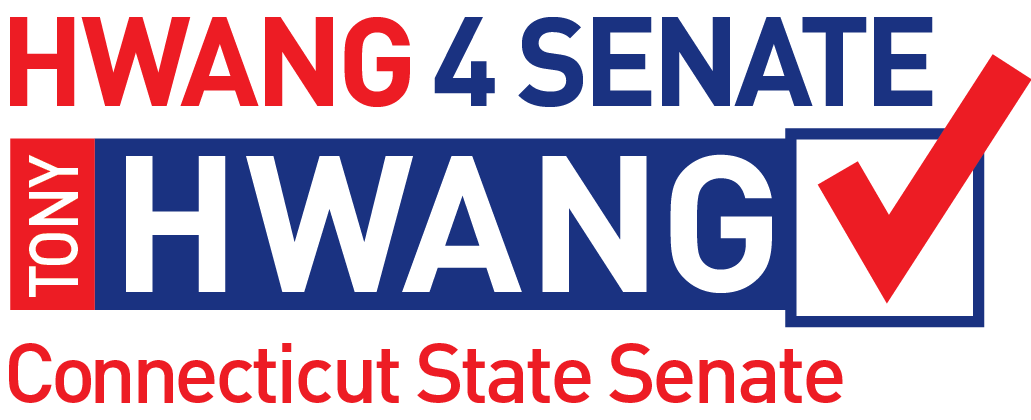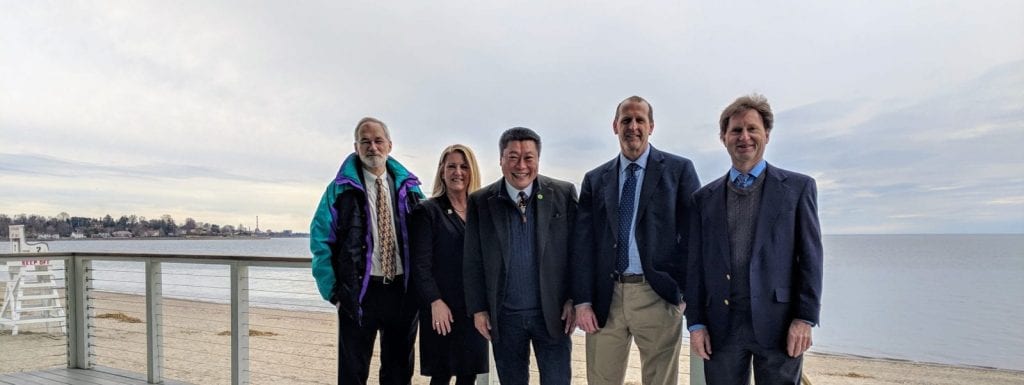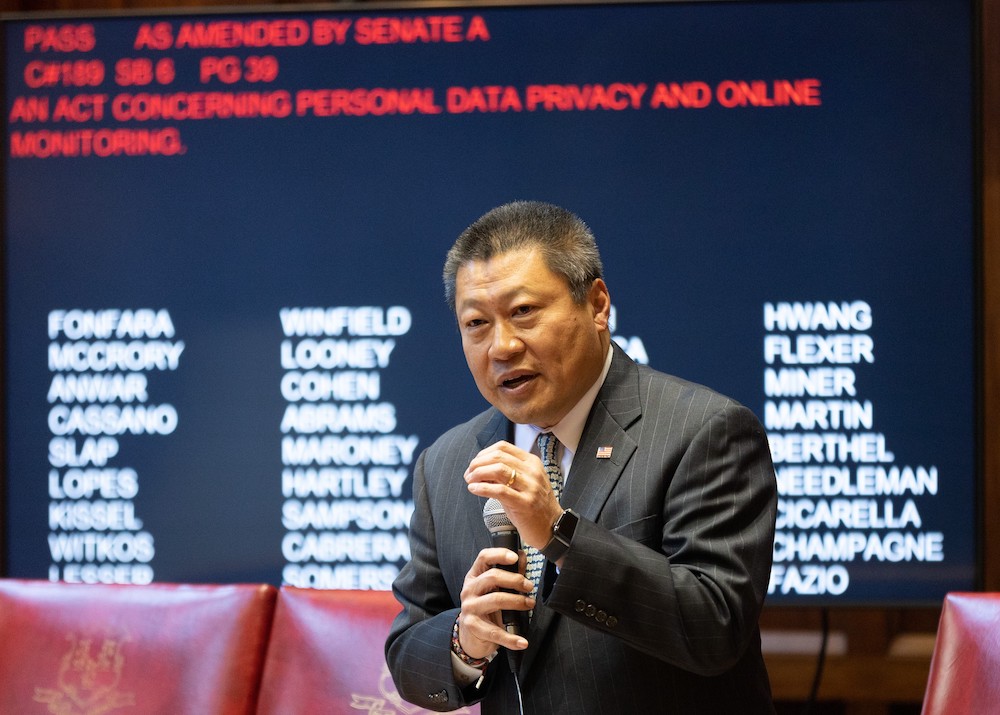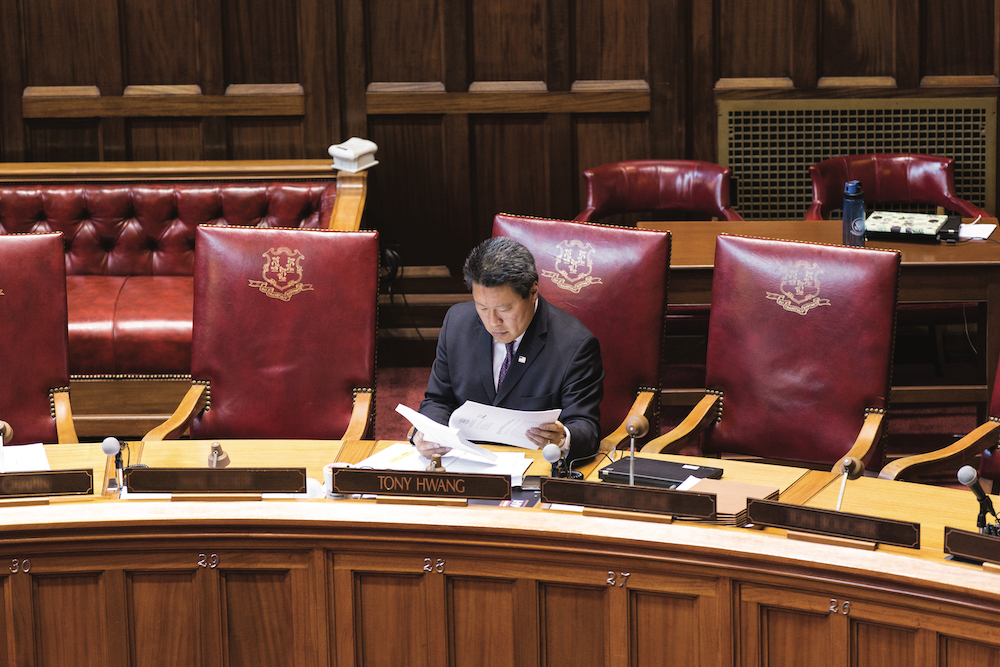
From left to right: Sylvain De Guise (Director, Connecticut SeaGrant at UConn), Nathan Frohling (Director, Connecticut Coastal and Marine Initiatives, The Nature Conservancy), Betsey Wingfield (Interim Deputy Commissioner, DEEP), State Representative Mary Mushinsky (D-85), State Senator Tony Hwang (R-28), State Representative Jonathan Steinberg (D-136), State Senator Christine Cohen (D-12), State Representative Mike Demicco (D-21), State Representative Geraldo Reyes (D-75)
CT-N Video of Informational Press Conference
Watch online: https://ct-n.com/ondemand.asp?ID=16141
Download file: http://ct-n.com/ondemand_download.asp?ID=bhekl
State Senator Tony Hwang (R-28), fellow lawmakers, the Connecticut Department of Energy and Environmental Protection (DEEP), and members of the Blue Plan Advisory Committee announced yesterday the release of the draft Long Island Sound Blue Plan and the commencement of the public comment period. To commemorate the release of the Blue Plan, DEEP, Senator Hwang hosted press, legislators, stakeholders, and members of the public at the Legislative Office Building on Thursday, March 21, 2019.
The event marks the start of the formal 90-day comment period, running through June 21, 2019. Proponents of the plan hoped to give an opportunity for the public to provide feedback on the Plan to ensure transparency.
Senator Tony Hwang (R-Fairfield), who worked with former Senator Ted Kennedy, Jr. (D-Branford) and former Representatives James Albis (D-East Haven) and Lonnie Reed (D-Branford) in the passage of the Blue Plan legislation in 2015, hosted Thursday’s press conference saying, “The Long Island Sound is one of the most important ecological, economic and recreational assets that the State of Connecticut has, and it is critical that we fully understand its spatial bathymetry, ecosystem and impacts of human use to develop a comprehensive “Blue Plan” strategy to maintain and improve the long term health of the Sound”
“We all recognize the vital importance of Long Island Sound to our economy, environment and quality of life,” said Representative Joe Gresko (D-Stratford). “The Blue plan will protect the Sound for recreational and economic uses while ensuring its overall environmental health for future generations.”
DEEP Commissioner Katie Dykes, who was unable to attend the event, noted, “After three years of background research and preparation, unanimous bipartisan support from the General Assembly and the governor, critical outreach and engagement with stakeholders, ecological experts, and various partners, and countless hours of dedication from Advisory Committee members, the Long Island Sound Blue Plan is completed and ready for public review. We are thankful to Senator Hwang for his leadership on Long Island Sound issues and for the support of so many others in the General Assembly in moving this process forward.”
“The Blue Plan provides an opportunity for all with a stake in the future of Long Island Sound to be heard. We are proud to be part of a process that honors these perspectives, employs the best knowledge and protects what we love—places important for nature and for people. Despite differences, everyone wins in working together for what matters most,” said Nathan Frohling, Director of Connecticut Coastal and Marine Initiatives for The Nature Conservancy.
The Blue Plan, legislation created through Public Act 15-66, is not hard and fast regulation, but rather a roadmap or a guidebook that enables a process by which Connecticut can develop a marine spatial plan to protect Long Island Sound’s natural resources and traditional human uses, while allowing for compatible future use and development. The Blue Plan aims to achieve this goal by creating a series of resources and information that can help planners and applicants, make better coordinated and compatible decisions.
For more information and to provide comments or feedback on the Blue Plan, please contact DEEP.LISBluePlan@ct.gov or visit the Blue Plan website at www.ct.gov/deep/lisblueplan.


















